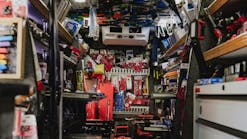Content brought to you by Professional Distributor. To subscribe, click here.
As more and more technology gets packed into the modern vehicle, batteries have become increasingly important. A car battery’s function isn’t just to turn on the vehicle, it runs your headlights, your A/C, your GPS, the radio, and so much more — making proper care and maintenance a priority for vehicle owners. However, when a technician pops the hood to give a vehicle’s battery a little TLC, there are quite a few options for what they might find.
Over the past few years, there’s a been surge in different battery technologies. From start-stop batteries to electric, technicians may be seeing enhanced flooded batteries (EFBs), enhanced cyclic mat (ECM), absorbed glass mat (AGM), lithium-ion, gel cell, or others. With all these different types of batteries come variations in how to maintain them as well as potentially different tools and equipment to get that job done.
Richard and Danielle Downing are the Texas-based independent mobile tool distributor team that make-up Big Country Tools. The duo makes sure their truck is stocked with the battery maintenance tools and equipment their customers need. With a variety of stops ranging from heavy duty to independent to dealerships, they try to have plenty of product options available.
Richard is the face of the business, driving the truck and meeting up with the customers, and Danielle handles the behind the scenes work of managing the accounts payable, ordering, receiving orders, checking orders in, and stocking the truck. Richard notes that she is the “backbone” of the business.
“If wasn’t for her,” he says, “I wouldn’t be where I am today.”
And where he’s at now is almost seven years working as a distributor (with Danielle by his side every step of the way). Previously, Downing worked as heavy duty technician for about 16 years. With this industry knowledge, it makes it easy to ensure he’s putting the right tools into his customers’ hands.
What a shop needs for battery maintenance
As with any vehicle system, there’s an assortment of tools and equipment that a technician needs to do their work.
On the truck, Downing keeps the SOLAR line from Clore, equipment from Midtronics, and occasionally some products from TOPDON to fill his customers’ battery maintenance needs.
More specifically, however, shops will need quality testing equipment — ideally a digital tester and a carbon pile tester — as well as a jump starter and a battery charger that includes a power supply mode.
“The first thing [a technician has] to know is what batteries need service,” says Jim O’Hara, vice president of marketing for Clore Automotive. “So, I would start with quality testing equipment.”
O’Hara recommends that shops have both a digital battery tester (with a printer) and a carbon pile tester, as there are some batteries that can fool one of the testers, but it’s very rare to have a battery that can fool both. Another reason to suggest your customers grab both testers is the potential of a remotely located battery.
“In order to get an accurate reading on [a remotely located] battery, [technicians] need to apply an accurate load,” explains Kim Cottle, president and CEO of Associated Equipment. “And typically, carbon pile load testers are the best method for doing remotely mounted batteries.”
Moving on to battery chargers. Due to the power demands on a vehicle’s battery, it’s best to think of charging the battery proactively.
“We like to say, ‘The hood goes up, the charger goes on,’” O’Hara says.
Whatever work a technician may be doing on a vehicle, whether it’s ADAS calibration, reprogramming, or something else, they’re going to want to keep the vehicle’s battery charged and at a consistent voltage, which is where having a battery charger with a power supply mode comes in.
If the technician isn’t keeping the battery at an appropriate voltage, they may not be able to complete the job they’re working on, O’Hara notes. And if they do continue, this could cause damage to the battery either causing it to need to be replaced, which is expensive, or significantly shortening the life of the battery. The power supply mode helps prevent this by keeping the battery at a consistent voltage level.
Part of keeping the battery at its required voltage level also comes from using the correct charger, which is why it’s so important for the technician to know what type of battery they are charging, Cottle notes, that way they can pair the necessary charger and battery together and prevent unwanted damage.
Purchasing considerations
Before making a purchase it’s likely your customers will have some questions. Some customers will have a specific idea of what they’re looking for while others may not even know where to start. Regardless of which type of customer you’re dealing with, it’s best to try to prepare for whatever questions you may receive.
Versatility
With all the different types of batteries (lead acid, lithium, etc.), it can be difficult to have battery maintenance tools that do it all, so when you’re stocking your truck, try to find versatile products to offer your customers.
Associated Equipment’s Intellamatic Smart Battery Charger and Analyzer is designed to charge a variety of different batteries including enhanced flooded and lithium, Cottle notes. Users can also adjust the amperage and voltage within a certain range on the machine.
Additionally, CTEK’s PRO25S 25A Battery Charger and Power Supply also has the ability to charge both lead acid and lithium batteries, as well as offering an option for battery support, explains Tony Zeal, training manager for CTEK.
Multi-functional products save customers money, time, and space in the shop.
Shop dynamics
Before recommending any products to your customers, make sure you have a good understanding of what their shop does. An independent shop versus a heavy duty shop may have different needs. Knowing the number of bays and/or technicians in the shop is also important.
“If you've got five technicians,” Zeal says, “and they all have a requirement for a battery charger, it’s no good purchasing one battery charger.”
Some shops may be able to get by with just one battery charger, but Zeal notes, this could mean only getting through one job a day per technician as they wait their turn to use the battery charger. An insufficient amount of equipment could also mean a job is being rushed to pass along the charger and done poorly, which could result in a customer’s vehicle breaking down resulting in a negative impact on the shop’s reputation.
“Our personal philosophy at Clore,” O’Hara says, “is that every bay should have a charger.”
Quality
Though quality seems like an obvious consideration to make before purchasing a product, some of your customers may only pay attention to the price. While buying a cheaper product may seem like a good idea at the time, Zeal notes that “If you buy cheap, you buy twice.”
Though just telling your customers that the cheaper products may not be as high of quality may not convince them to purchase a better product, however, discussing ripple in battery chargers might.
“Very few people actually look into these things, but there are chargers out there with a high ripple,” Zeal says, “and it's usually associated with cheaper chargers.”
Ripple occurs in a battery charger when it converts from AC to DC and some of the AC signal gets through to the DC side of the system, Zeal explains. A high ripple (anything over two percent) tends to heat up the battery and can cause internal damage.
Be sure to stock quality battery maintenance equipment on your truck and be ready to offer your customers guidance if they get starstruck by a low price.
Sales tips
Selling battery maintenance tools and equipment isn’t always easy, but if you understand your product and can show your customers what it can do, it’ll help you close that deal.
1. Use your experience
As a technician turned independent distributor, Downing is able to put himself in his customers’ shoes.
“I was never a salesman,” Downing says, “but I can relate to people on what they are working on.”
He often uses a story from when he was still working as a tech, to help sell his SOLAR battery tester. Downing had received a call from a man whose vehicle wouldn’t start. The vehicle’s battery was only four or five months old, and even after trying to jumpstart it, it still did nothing. At first, Downing was going to take a look at the wiring, but then decided against that and used his SOLAR battery tester instead. After testing the battery, he found it had a shorted cell, and once he replaced the vehicle’s battery it worked just fine. This experience sold Downing on the SOLAR brand, and now he uses it to help convince his customers of the same thing.
2. Understand your product
Being able to have a conversation with your customers about the products you’re selling is a part of making the sale, but if you don’t understand the products you’re selling, it’s difficult to convince your customers that this is something they need.
Downing notes his technical background has certainly helped him with understanding battery maintenance and what tools his customers need, but even with that background he still has to put in work to stay up to date. He likes to attend webinars put on by companies like SOLAR, TOPDON, or anybody offering a webinar on the topic. Additionally, he’ll just ask his customers.
“Honestly, I lean a lot on some of my more senior technicians,” Downing says. “I just try to touch base with them, feel them out. ‘Hey, what's coming out? What's new? What do I need to be looking for?’ And they're usually pretty helpful.”
3. Show the product in action
Some products don’t lend themselves as easily as others to being demoed, and battery maintenance tools are no exception.
O’Hara points out that something like Clore’s JNC770 Jump Starter is an easier product to demo, where distributors can show things like how long the cables are, the on/off switch, the USBs, etc. Whereas with something like their PL2320 Battery Charger, it’s difficult to demo anything unless you have a battery to attach it to, especially with the feature that enables it to force a battery at 0V to start charging.
This is why Downing typically takes his demos in-house.
“If I get a guy on the truck that’s looking for battery testing equipment, he's usually got a vehicle sitting in the shop that needs battery testing,” Downing says. “So, we'll take it off the truck from there and then we'll run a demo on the vehicle that he's working on.”
4. Look for add-on sales
Safety is an important aspect of battery maintenance.
“There's obviously the safety requirements where you should always be using goggles because of the fact that you're dealing with a caustic chemical,” Cottle explains. “There are also safety things that you need to take into consideration in terms of understanding how you hook things up and how you charge things and how you unhook them.”
Keeping this in mind while selling battery testers and other equipment, you may be able to sell a pair of safety glasses or gloves to help protect your customer while they get the job done.






